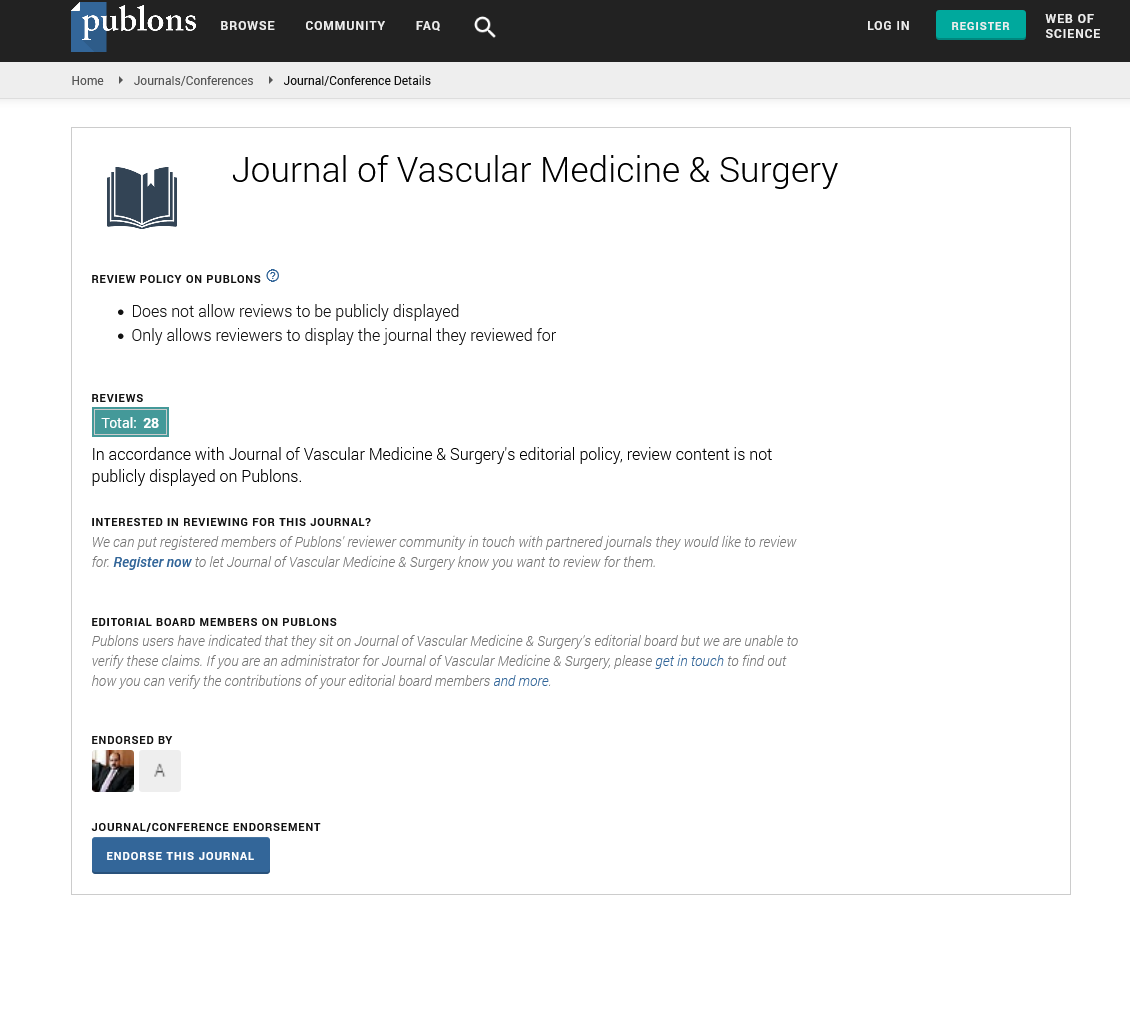Indexed In
- Open J Gate
- Academic Keys
- RefSeek
- Hamdard University
- EBSCO A-Z
- OCLC- WorldCat
- Publons
- Euro Pub
- Google Scholar
- SHERPA ROMEO
Useful Links
Share This Page
Journal Flyer

Open Access Journals
- Agri and Aquaculture
- Biochemistry
- Bioinformatics & Systems Biology
- Business & Management
- Chemistry
- Clinical Sciences
- Engineering
- Food & Nutrition
- General Science
- Genetics & Molecular Biology
- Immunology & Microbiology
- Medical Sciences
- Neuroscience & Psychology
- Nursing & Health Care
- Pharmaceutical Sciences
Commentary Article - (2024) Volume 0, Issue 0
The Essentials of Vascular Dementia: Causes, Diagnosis and Effective Management
Zhang Xiaping*Received: 29-Jul-2024, Manuscript No. JVMS-24-26835; Editor assigned: 31-Jul-2024, Pre QC No. JVMS-24-26835 (PQ); Reviewed: 14-Aug-2024, QC No. JVMS-24-26835; Revised: 21-Aug-2024, Manuscript No. JVMS-24-26835 (R); Published: 30-Aug-2024, DOI: 10.35248/2329-6925.24.S23.554
Description
Vascular dementia is a common kind of dementia characterized by decreased blood supply to the brain, which results in cognitive impairment. It is one of the most frequent types of dementia after Alzheimer's disease it can have significant effects on a person's memory, cognition and daily functioning. It is an example of cognitive disability that occurs when the brain's blood flow becomes impaired, resulting injury to brain cells. These difficulties can be caused by a variety of vascular problems, including strokes, small vessel disease and other conditions that affect the blood vessels. Similar to Alzheimer's disease, which is primarily associated with the development of abnormal proteins in the brain, vascular dementia is directly connected to the health of the brain's blood vessels.
Management and treatment
There is currently no cure for vascular dementia, but treatment focus on treating the fundamental vascular causes, managing symptoms and enhancing quality of life. Important management techniques include.
Managing risk factors: Controlling risk factors such as high blood pressure, diabetes, high cholesterol and heart disease is essential in slowing the progression of vascular dementia. This may involve lifestyle changes, medications and regular monitoring by healthcare providers.
Medications: Certain medications may be prescribed to manage symptoms of vascular dementia or treat underlying conditions. These may include antiplatelet drugs (e.g., aspirin) to reduce the risk of stroke, medications to control blood pressure or cholesterol or drugs to manage emotional changes.
Cognitive rehabilitation: Cognitive rehabilitation involves treatments and exercises that improve cognitive function, such as memory development, problem-solving challenges and brain-activating functions.
Physical activity: Regular physical activity can improve cardiovascular health, enhance mood and help to maintain physical function. Exercise programs developed to the individual's abilities can be beneficial.
Diet and nutrition: A heart-healthy diet that includes plenty of fruits, vegetables, whole grains and lean proteins can helps to reduce the risk of further vascular damage. Reducing salt intake, reducing saturated fats and avoiding processed foods are important dietary considerations.
Smoking cessation and alcohol moderation: Avoid smoking and reducing alcohol consumption can significantly reduce the risk of further vascular damage and improve overall health.
Support and education: Support for families as well as education about the condition, can help in managing vascular dementia. Support groups, counseling and resources from organizations such as the Alzheimer's association can provide valuable assistance.
Diagnosis of vascular dementia
Diagnosing vascular dementia involves a comprehensive assessment that includes.
A detailed medical history, including information about any history of strokes, heart disease, high blood pressure, diabetes and other risk factors, is essential for diagnosing vascular dementia. A neurological examination helps to evaluate cognitive function, reflexes, co-ordination and other aspects of nervous system functioning. Memory, attention, language and other cognitive functions are evaluated with cognitive tests such as the Mini-Mental State Examination (MMSE) and the Montreal Cognitive Assessment (MoCA). Brain imaging techniques such as Magnetic Resonance Imaging (MRI) or Computed Tomography (CT) scans can help to identify changes in the brain associated with vascular dementia, such as evidence of strokes, small vessel disease or other vascular abnormalities.
Blood tests can help to identify underlying conditions that may contribute to vascular dementia, such as high cholesterol, diabetes or vitamin deficiencies. Evaluating cardiovascular risk factors, such as high blood pressure, smoking or obesity, it is important for understanding the underlying causes of vascular dementia.
Citation: Xiaping Z (2024). The Essentials of Vascular Dementia: Causes, Diagnosis and Effective Management. J Vasc Surg. S23:554.
Copyright: © 2024 Xiaping Z. This is an open access article distributed under the terms of the Creative Commons Attribution License, which permits unrestricted use, distribution, and reproduction in any medium, provided the original author and source are credited.

